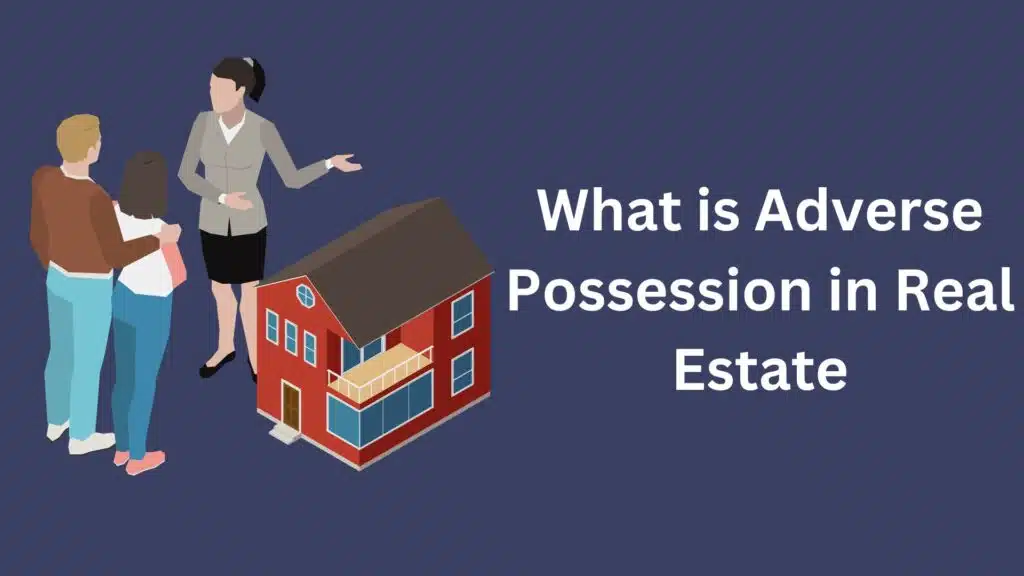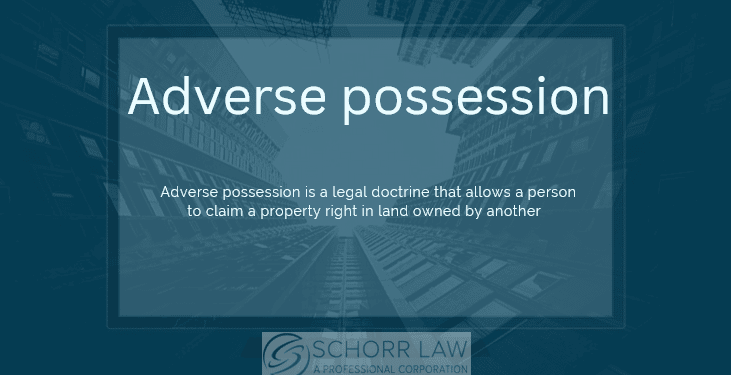What is adverse possession in Real Estate? Adverse possession is a legal doctrine allowing someone to claim ownership of land under certain conditions. It involves occupying property without permission for a specified period.

Adverse possession can significantly impact property rights. This legal concept requires the possessor to use the land openly and continuously. The original owner must not take legal action to evict the possessor during this time. Each jurisdiction has specific requirements and timeframes for adverse possession claims.
Understanding this doctrine is crucial for both property owners and potential claimants. It ensures that rights are exercised and protected according to the law. Adverse possession underscores the importance of monitoring and maintaining one’s property boundaries. Proper knowledge can prevent unwanted legal disputes over land ownership.
Introduction To Adverse Possession
What is Adverse Possession in Real Estate? Adverse possession is a unique concept in real estate law. It allows a person to claim ownership of land they do not own. This claim is made by continuous use of the property over a period of time.
Concept Overview
Adverse possession means someone can take ownership of land. The person must use the land openly and without permission. They must do this for a specific period, often many years.
- Use must be continuous.
- Use must be open and obvious.
- Use must be without the owner’s permission.
Historical Background
Adverse possession has roots in old English law. It aimed to encourage land use and prevent disputes. Over time, it evolved into modern laws.
In the United States, each state has its own rules. The time period for claiming land varies. Some states require 10 years; others require 20 years or more.
| State | Years Required |
|---|---|
| California | 5 Years |
| New York | 10 Years |
| Texas | 10 Years |
| Florida | 7 Years |
Legal Requirements
Adverse possession is a legal principle in real estate. It allows someone to claim ownership of land under specific conditions. Understanding the legal requirements is crucial for anyone facing or attempting an adverse possession claim.
Continuous Possession
For adverse possession to be valid, the possessor must have continuous possession of the property. This means the individual must use the land in a manner consistent with its intended use. The time period for continuous possession can vary by jurisdiction. Typically, it ranges from 5 to 20 years.
To establish continuous possession, the possessor should:
- Live on the property consistently.
- Maintain the land and structures.
- Pay property taxes, if applicable.
Exclusive Use
Another critical requirement is exclusive use of the property. The possessor must use the land without sharing it with others, including the legal owner. This exclusive use demonstrates the possessor’s control over the property.
To prove exclusive use, the possessor should:
- Install fences or barriers.
- Restrict access to others.
- Make improvements or alterations.
| Requirement | Description | Examples |
|---|---|---|
| Continuous Possession | Uninterrupted use of the land over time. | Living on the property, maintaining the land. |
| Exclusive Use | Sole use of the property without sharing. | Installing fences, restricting access. |
Elements Of Adverse Possession
Adverse possession allows someone to claim another’s land. To succeed, certain elements must be met. These elements ensure fair and lawful claims. Below, we explore two key elements: actual possession and hostile claim.
Actual Possession
Actual possession means using the land like an owner. This includes living there or farming it. The usage must be obvious and continuous. You can’t just visit occasionally. The true owner must see your use.
Hostile Claim
A hostile claim is not aggressive. It means using the land without permission. The use must be against the owner’s rights. The claim must be clear and obvious. The owner should know you’re using the land.

Credit: m.youtube.com
Statutory Periods
Understanding the statutory periods is crucial in adverse possession claims. These periods vary by location and are defined by law. They determine how long a trespasser must occupy a property before claiming ownership. Let’s dive into the specifics.
Time Frames
The time frames for adverse possession can differ significantly. In some places, it might be as short as five years. In others, it could extend to 20 years. This period must be continuous and uninterrupted. The trespasser must openly use the land during this time. They must act like the true owner.
| Location | Statutory Period |
|---|---|
| California | 5 years |
| New York | 10 years |
| Texas | 10 years |
| Florida | 7 years |
Variations By Jurisdiction
Jurisdictions have unique rules for adverse possession. Some require the trespasser to pay property taxes. Others might need the trespasser to have a specific intent. This means some places are stricter than others. Legal requirements can include:
- Payment of property taxes
- Good faith belief of ownership
- Written notice to the true owner
Each jurisdiction has its own laws. Knowing the local rules helps in understanding adverse possession better. Always check the specific laws in your area.
Challenges And Defenses
What is adverse possession in Real Estate? Understanding adverse possession in real estate can be complex. Property owners face numerous challenges and defenses. This section will explore these crucial aspects.
Owner’s Rights
Property owners have specific rights to protect their land. They can take legal action against trespassers. Regular inspections of the property help identify unauthorized use.
Maintaining clear property boundaries is vital. Owners should ensure fencing and signage are in place. Documenting property usage is equally important.
Common Legal Defenses
There are several legal defenses against adverse possession claims. Below is a table listing these common defenses:
| Defense | Description |
|---|---|
| Permission | If the owner gave permission, it isn’t adverse possession. |
| Interruption | Owner interrupts possession before the statutory period ends. |
| Filing a Lawsuit | Legal action can prevent adverse possession claims. |
Using these defenses, owners can safeguard their property. Always seek legal advice for specific situations.

Credit: slideplayer.com
Case Studies
What is adverse possession in Real Estate? Adverse possession can be complex. Real-life examples help clarify it. These case studies show how adverse possession works in real estate. Learn from real cases to understand its impact better.
Notable Cases
Several famous cases highlight adverse possession. These examples show different scenarios and outcomes.
| Case Name | Year | Key Details |
|---|---|---|
| Howard v. Kunto | 1970 | Continuous use of property for years led to ownership. |
| Van Valkenburgh v. Lutz | 1952 | Improving land and using it openly established possession. |
| Fulkerson v. Van Buren | 1997 | Church used land for decades and gained ownership. |
Lessons Learned
- Adverse possession requires continuous and open use of land.
- Improving the property can strengthen the claim.
- Each state has different requirements and timeframes for adverse possession.
- Legal advice is crucial to navigate adverse possession cases.
Impact On Property Owners
What is adverse possession in Real Estate? Adverse possession is a legal doctrine that affects property owners. It allows someone to claim ownership of land they do not own. This can have significant consequences for property owners.
Potential Risks
Property owners face several risks due to adverse possession:
- Loss of property: Owners might lose their land to squatters.
- Legal battles: Defending against adverse possession can be costly.
- Decreased property value: Disputes may lower the property’s market value.
Property owners must understand these risks. Awareness helps in taking the necessary steps to protect their land.
Preventive Measures
To prevent adverse possession, property owners can take several steps:
- Regular inspections: Check your property regularly for trespassers.
- Clear boundaries: Mark property lines clearly to avoid disputes.
- No trespassing signs: Post signs to deter squatters.
- Legal action: Quickly address any encroachments legally.
These measures help safeguard your property from adverse possession claims. Property owners should stay vigilant and proactive.

Credit: schorr-law.com
Practical Tips
What is adverse possession in Real Estate? Understanding adverse possession can be complex. Here are practical tips to help you navigate. These tips will help protect your property rights and ensure legal compliance.
Documenting Property Use
It’s essential to document your use of the property. This helps establish your claim. Keep a detailed record of dates and activities.
- Take photos regularly
- Maintain a journal of your property use
- Collect witness statements
These records can be crucial in proving continuous use. Ensure all documents are organized and accessible.
Consulting Legal Experts
Consulting a legal expert is vital. They can offer tailored advice based on your situation. Seek guidance from a real estate attorney.
- Find an experienced attorney
- Discuss your documentation with them
- Follow their advice on legal steps
Legal experts can help navigate complex laws. Their expertise ensures your actions are legally sound.
Conclusion
Understanding adverse possession is crucial for real estate investors and homeowners. It involves legal principles that can impact property rights. Staying informed helps protect your assets and make sound decisions. Always consult a real estate attorney for specific cases. Knowledge about adverse possession safeguards your property interests and ensures peace of mind.






